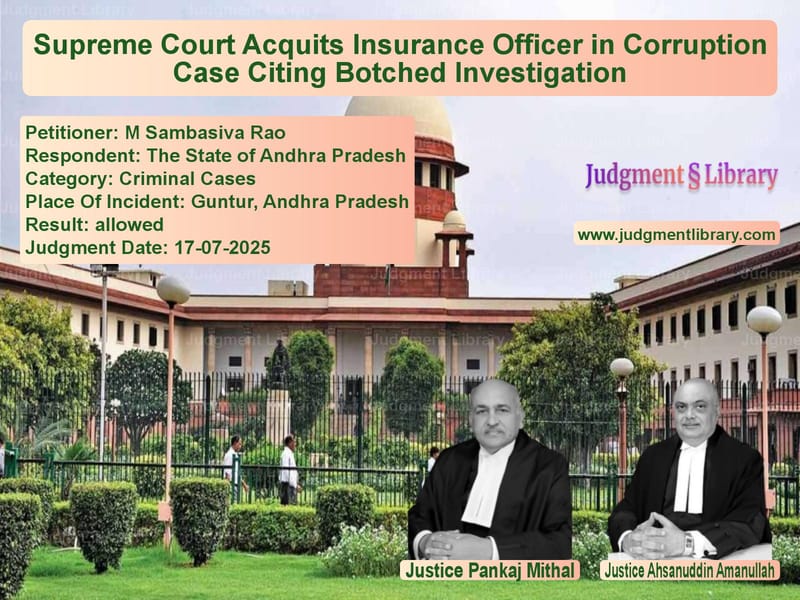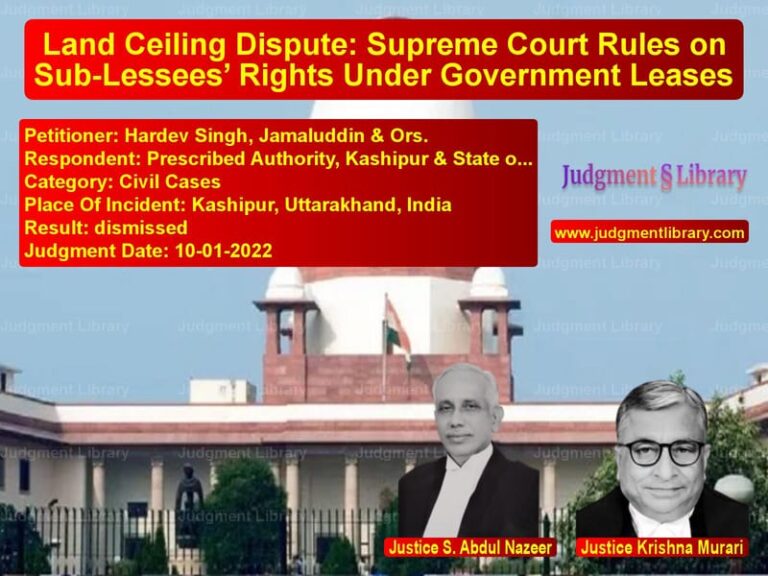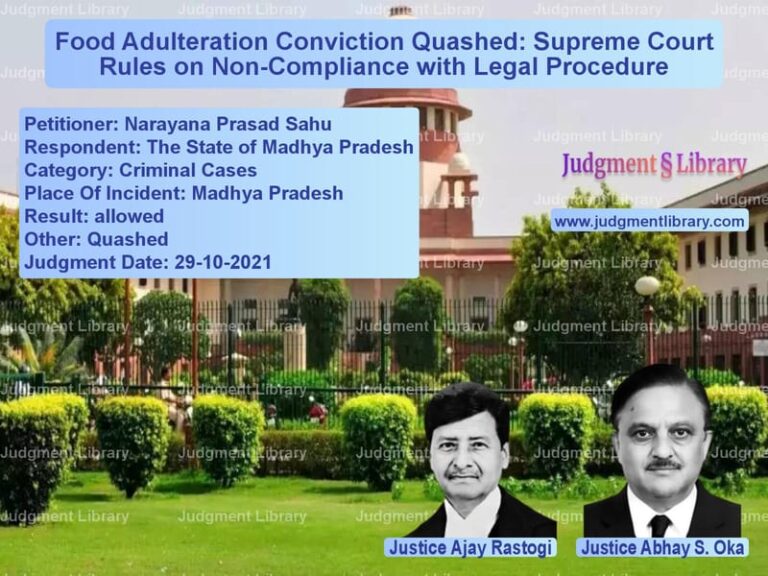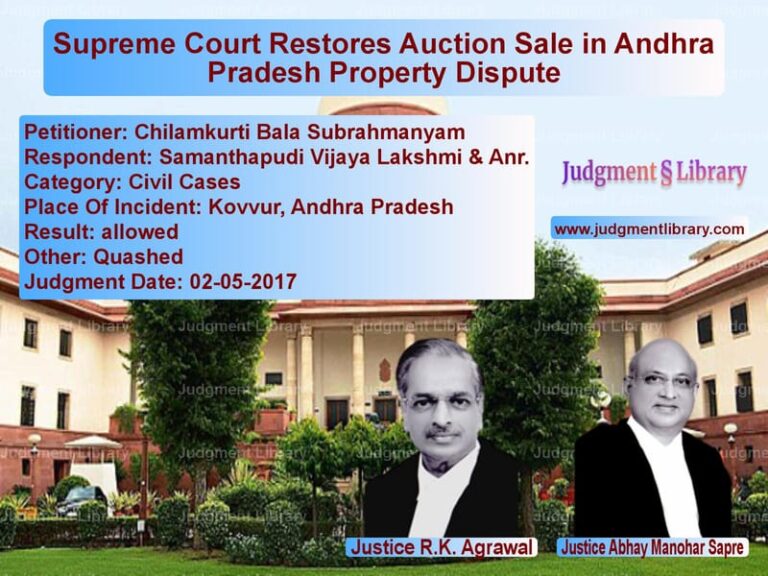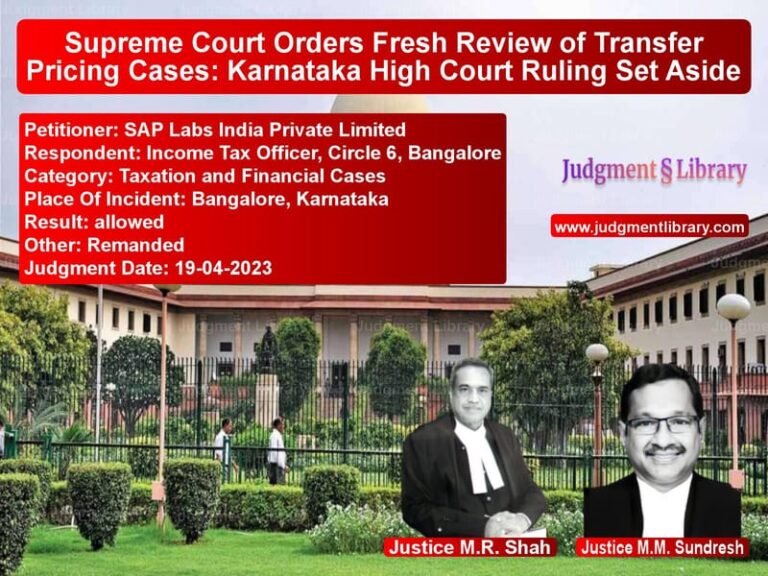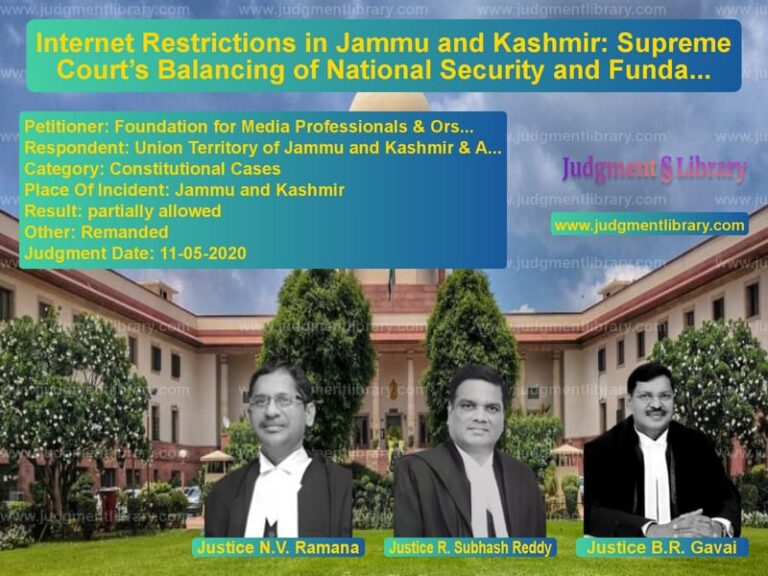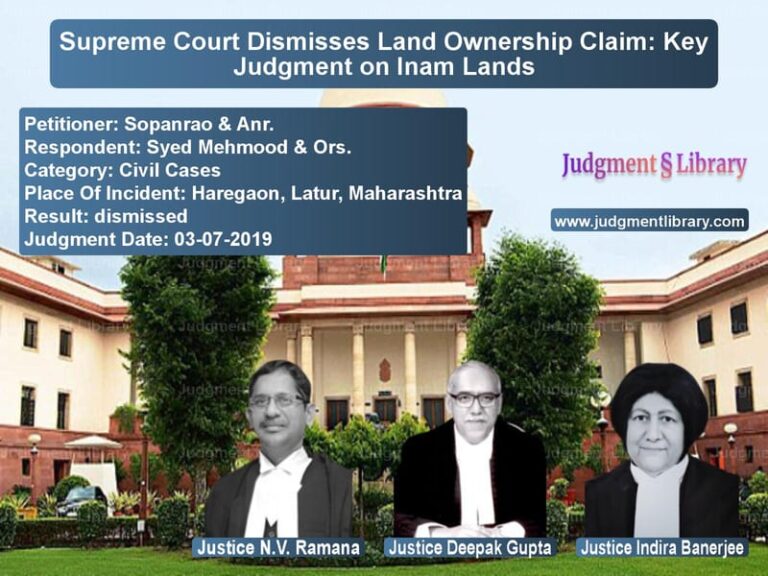Supreme Court Acquits Insurance Officer in Corruption Case Citing Botched Investigation
In a significant ruling that underscores the importance of procedural integrity and evidentiary standards in corruption cases, the Supreme Court of India has acquitted an insurance company officer who had been convicted by the High Court in a bribery case. The judgment delivered on July 17, 2025, highlights serious flaws in the investigation and raises questions about the prosecution’s version of events. The case involves M Sambasiva Rao, an Assistant Administrative Officer with United India Insurance Company, who was accused of demanding a bribe of Rs. 40,000 to process an insurance claim following the accidental death of a policyholder.
The case dates back to 1999 when L Laxman Reddy had taken a personal accident insurance policy for Rs. 8 lakh. After his accidental death on March 28, 1999, his wife and nominee, Srilakshmi, submitted a claim through her maternal uncle T Kotireddy. The prosecution alleged that Sambasiva Rao demanded a bribe of Rs. 40,000 to facilitate the claim settlement, with Rs. 5,000 meant for himself and Rs. 35,000 for the Regional Manager. When the complainant approached the CBI, a trap was laid, leading to the arrest of the accused persons. However, the trial court acquitted all accused in 2005, a decision that was reversed by the High Court in 2015, convicting Sambasiva Rao and his brother.
The Legal Battle
Senior counsel Jayant Bhushan, representing the appellant, made several crucial arguments before the Supreme Court. He emphasized that “where two views are possible on the same evidence, and the Trial Court’s view favours the accused, the Appellate Court shall not ordinarily interfere unless the findings are perverse or unreasonable and based on no evidence.” He further argued that “in a case of acquittal, there is a double presumption of innocence in favour of the accused and the High Court should have reversed the acquittal only on cogent grounds.”
Bhushan pointed out that the appellant had already processed and recommended the claim file before the alleged demand for bribe, making the prosecution’s case illogical. He highlighted multiple inconsistencies in the prosecution evidence, including discrepancies about the color of a seized shirt and the application of phenolphthalein powder. The defense also raised serious questions about the involvement of the Superintendent of Police in the trap proceedings, which was not properly documented.
On the other side, Additional Solicitor General Vikramjit Banerjee argued for the State that the High Court had correctly re-appreciated the evidence and found the trial court’s judgment perverse. He contended that “the processing/clearing of the claim at the level of the appellant before the date of demand is of no consequence, as the demand made by the appellant was not to clear the file at his level but to liaison with accused no.2 to get the claim settled.” The ASG relied on precedent to argue that courts must recognize evolving methods of bribe-taking.
The Supreme Court’s Analysis
The Supreme Court bench comprising Justices Pankaj Mithal and Ahsanuddin Amanullah conducted a thorough examination of the evidence and legal principles. The court began by referencing the landmark judgment in Neeraj Dutta v State (NCT of Delhi), which established the evidentiary standards for proving corruption offenses. The court noted that “Proof of demand and acceptance of illegal gratification by a public servant as a fact in issue by the prosecution is a sine qua non in order to establish the guilt of the accused public servant under Sections 7 and 13(1)(d)(i) and (ii) of the Act.”
The court identified three glaring contradictions that fundamentally undermined the prosecution’s case. First, the involvement of the Superintendent of Police in the trap proceedings created serious doubts about the investigation’s integrity. The court noted that while prosecution witnesses denied the SP’s presence, his tour diary clearly indicated he “reached Hyderabad and participated in trap and started Hyderabad to Vishakhapatnam.” This unimpeachable document conclusively falsified the investigating officer’s evidence.
Second, the court expressed astonishment at the High Court’s handling of the seized shirt evidence. While witnesses claimed accused no. 3 was wearing a white shirt that was seized, the shirt produced in court was moss-colored. The High Court had bizarrely explained that “since the ‘white’ shirt was seized in 1999, due to the efflux of time, its white colour would have withered away due to dust.” The Supreme Court found this reasoning unacceptable, stating “We are quite dumb-founded by the explanation offered by the High Court, to fill in a glaring gap in the prosecution case, which is beyond comprehension.”
Third, the court noted the suspicious presence of phenolphthalein powder on the whisky box when the first mediators’ report showed no powder had been applied to it. The High Court had speculated that the powder transferred from the tainted currency to the complainant’s hands and then to the box. The Supreme Court rejected this conjectural reasoning, emphasizing that “to presume such fact in a criminal trial, having severe eventual penal consequences, is something that we express our clear reservation on.”
Presumption of Innocence and Benefit of Doubt
The court reinforced the fundamental principle of criminal jurisprudence that an accused is presumed innocent until proven guilty. Quoting from Jafarudheen v State of Kerala, the bench observed that “While dealing with an appeal against acquittal by invoking Section 378 CrPC, the appellate court has to consider whether the trial court’s view can be termed as a possible one, particularly when evidence on record has been analysed. The reason is that an order of acquittal adds up to the presumption of innocence in favour of the accused.”
The judgment further cited Suresh Thipmppa Shetty v State of Maharashtra, emphasizing that “when this Court is confronted with a situation where it has to ponder whether to lean with the Prosecution or the Defence, in the face of reasonable doubt as to the version put forth by the Prosecution, this Court will, as a matter of course and of choice, in line with judicial discretion, lean in favour of the Defence. We have borne in mind the cardinal principle that life and liberty are not matters to be trifled with, and a conviction can only be sustained in the absence of reasonable doubt.”
The court also questioned the basic logic of the prosecution’s case, noting that it made little sense for the appellant to demand a bribe when he had already processed the claim file. Furthermore, the relationship between the appellant and the Regional Manager was clearly antagonistic, as evidenced by transfer orders and vigilance complaints, making conspiracy between them highly improbable.
Conclusion
In its final analysis, the Supreme Court concluded that “the prosecution has not proved beyond reasonable doubt the demand of and acceptance of the bribe in the trap laid by PW12. This is, to be charitable to the investigative agency, at best a case of a botched-up trap with serious lapses committed by the investigative agency.” The court went even further, suggesting that “At its worst, this case is an example of fabrication and attempted frame-up.”
The judgment serves as a crucial reminder of the high standards of proof required in criminal cases, especially those involving corruption charges where the consequences for the accused are severe. It reinforces the judiciary’s role as a protector of individual rights against procedural irregularities and insufficient evidence. The Supreme Court’s meticulous examination of the facts and its commitment to due process ensure that convictions are based on solid evidence rather than suspicion or procedural flaws.
Petitioner Name: M Sambasiva Rao.Respondent Name: The State of Andhra Pradesh.Judgment By: Justice Pankaj Mithal, Justice Ahsanuddin Amanullah.Place Of Incident: Guntur, Andhra Pradesh.Judgment Date: 17-07-2025.Result: allowed.
Don’t miss out on the full details! Download the complete judgment in PDF format below and gain valuable insights instantly!
Download Judgment: m-sambasiva-rao-vs-the-state-of-andhra-supreme-court-of-india-judgment-dated-17-07-2025.pdf
Directly Download Judgment: Directly download this Judgment
See all petitions in Fraud and Forgery
See all petitions in Custodial Deaths and Police Misconduct
See all petitions in Other Cases
See all petitions in Judgment by Pankaj Mithal
See all petitions in Judgment by Ahsanuddin Amanullah
See all petitions in allowed
See all petitions in supreme court of India judgments July 2025
See all petitions in 2025 judgments
See all posts in Criminal Cases Category
See all allowed petitions in Criminal Cases Category
See all Dismissed petitions in Criminal Cases Category
See all partially allowed petitions in Criminal Cases Category

